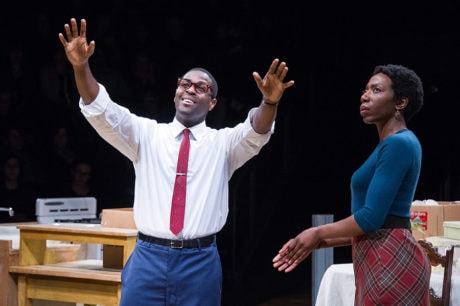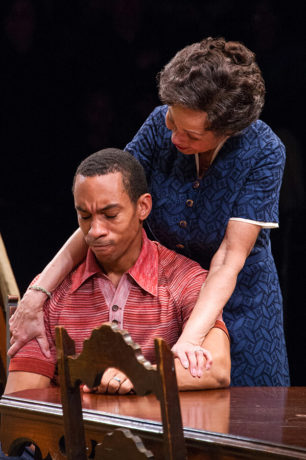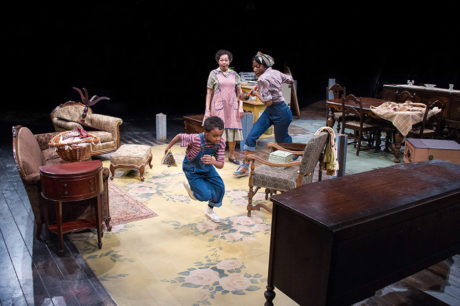“I am a giant surrounded by ants!” exclaimed Walter Lee Younger in a scene from A Raisin in the Sun. Walter is the embodiment of how society, family members, and internal struggle can defer dreams. Written by the gone but much remembered Lorraine Hansberry, this forward-looking and timeless play was truthfully directed by Tazewell Thompson in a way that mined many nuances of the struggle to be effectively human. Such is the truthfulness of the show, and it will leave audiences with a sense of wonder; Arena Stage’s A Raisin in the Sun is a lovely stage symphony of treasured performances.

Taking place in a small, critter-infested apartment on the South Side of Chicago in the early 1950s, A Raisin in the Sun looks at many universal issues: marriage and generational strife, blazing ambition, race and class prejudice, and ever-present dream killers. The play looks at the Youngers, a fifth-going-on-sixth generation American Black family in its quest to purchase a home at 406 Clybourne Street—despite the obstacles put in their way.
Of the multitude of superior performances in the show, Lizan Mitchell’s embodiment of matriarch Lena Younger was my favorite. Mitchell connected with her character on a spiritual level, making Hansberry’s character corporeal. I could feel Lena’s empathy for her son Walter when she said of him, “There’s always something left to love.”

The character of Walter Lee Younger, as far as I’m concerned, should be judged by his “proud people” speech. Will Cobbs in that speech and the preceding self-pitying meltdown, was superb. Cobbs’ Walter Lee was equal parts intense, personable, and misunderstood.
Joseph Asagai’s “I live the answer!” retort and speech to Beneatha Younger, Lena’s daughter, was one of many highlights in the show. Bueka Uwemedimo’s Asagai was a well-crafted portrait of a wise, insightful young man. Joy Jones’ Beneatha excelled in scenes in which she pushed the boundaries of 1959 America for a woman of color. Jones (a 2013 Helen Hayes Award winner for Outstanding Ensemble) was resplendent in a scene in which she wore African garb supplied by Asagai and later in scenes in which she sported a natural—shocking for that time.
Keith L. Royal Smith’s George Murchison, a spoiled snob, was pitch perfect in all of his scenes. I loved how he played the “guys don’t like the atmosphere” spiel he gave to Beneatha. Walter’s son Travis Younger was played with a cheerful innocence by Jeremiah Hasty. His scenes with his fictional parents spoke to the truth of being a child in an adult world.
Ruth Younger, Walter’s ever-patient wife, was played with every-woman endurance by Dawn Ursula (a Helen Hayes Award winner). In her facial expressions and body language, Ursula portrayed a wife running short on patience for her husband.
Karl Lindner of the Clybourne Park Improvement Association was played with brisk officiousness by Thomas Adrian Simpson, and Walter’s business partner Bobo was played with a mixture of weariness, fear, and disappointment by Mack Leamon (who appeared last summer in Radio Golf at Hard Bargain Players). I liked the verisimilitude of the silent-but-present Moving Men (Frank Riley III and Kamau Mitchell).
Thompson‘s direction revealed interesting directorial choices, the chief of which was presenting Walter in some scenes as fueled solely by anger, which overshadowed the nuances of the character; likewise, I got a sense that Simpson’s Linder could have been staged more from the perspective of a man simply protecting his turf, that is to say, more dimensional—which would have been controversial, no doubt. A non-existent door, which I was never sure was open or closed due to lack of actor pantomiming was distracting at first, but proved to be the right directorial choice. Overall, Thompson did a great job of allowing the emotional beats in Hansberry’s script, especially the family strife and marital strain in the first act, to rise to the top.

Donald Eastman’s set design, within the confines of Arena’s Fichandler Stage’s theater-in-the-round, featured a flown ceiling, with truncated windows and door posts and a stove on which Ruth apparently cooked eggs. Costume Designer Harry Nadal did great work with Walter’s 50’s fedora and windbreaker and Beneatha’s gorgeous African garb. The standing ovation the show received proved that A Raisin in the Sun is an audience-pleasing plum.
Running Time: Two hours and 45 minutes, with a 15-minute intermission.
A Raisin in the Sun plays through May 7, 2017, at Arena Stage – 1101 Sixth Street, SW, in Washington, DC. For tickets, call the box office at (202) 488-3300 or purchase them online.




